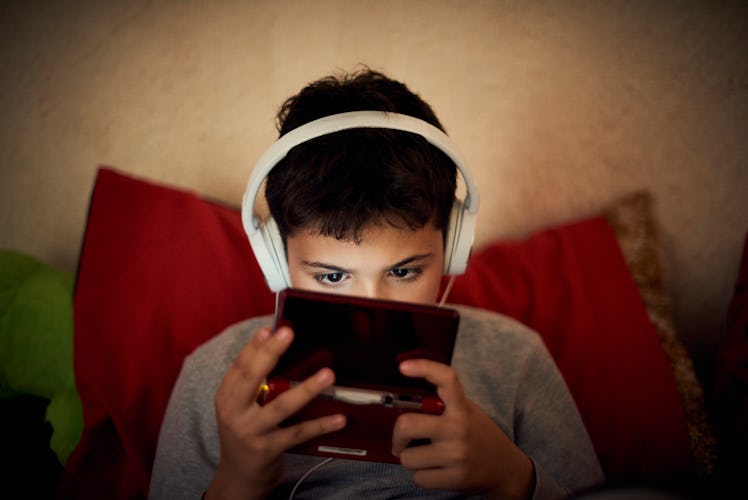Screen Time Literally Changes Young Kids' Brains
The research is eye-opening. But it doesn't mean parents need to freak out.

Whether it’s with TV, iPads, or smartphones, scientists have confirmed in a new study that screen time changes how a child’s brain grows and functions — often for the worst.
But perhaps the most surprising conclusion to be drawn from the over two decades of research was not about the many significant developmental risks associated with screen time. The biggest bombshell was that, in spite of these well-documented negative effects, the researchers aren’t telling parents to stop. Rather, they’re acknowledging that parents cannot put the tech genie back in the bottle.
“It is impossible to stop children from using digital devices integrated into their daily lives,” study author Hui Li, Ph.D., a professor at The Education University of Hong Kong, told Fatherly.
Rather, Li and his colleagues pose a more practical question in new meta-analysis research published today in the journal Early Education: Why don’t we improve technology so that it doesn’t hurt kids? Like hiding broccoli in brownies, this could be the path of least less resistance.
Screen Time Hurts Kids’ Brains
To investigate just how screen time affects the brains of young kids, Li and his team analyzed 33 neuroimaging studies of more than 30,000 children under 12 years old, as most visual and language development occurs before then.
They found that the impact of screen time was negative, significant, and came with specific consequences, including deficits in attention, impulse control, executive functioning, and overall cognitive functioning. Some studies included in the meta-analysis indicated that screen time can lead to lower levels of brain connectivity and even hinder brain growth.
You can put it simple: Phone use is shaping your kid’s brain.
Although there was no conclusive evidence that any type of tech was healthier, tablet users were found to have worse problem-solving skills. And of course, “intensive media usage” was shown to potentially impact visual processing and higher cognitive function regions.
“You can put it simple: Phone use is shaping your kid’s brain,” Li explains.
That said, parents don’t have to beat themselves up over letting their children have any screen time. Although our brains are most “malleable during childhood,” Li notes that “plasticity is a life-long process and our brains continue changing and adapting throughout our lives in response to our experiences.”
In other words, don’t freak out. As much as their developing brains are fragile, the effects of screen time are not set in stone and kids have plenty of time to build up the parts of their brains that might be hurt from it.
Screen Time Isn’t All Bad For Kids
Despite all these negative findings, there were six studies that demonstrated how technology can have positive effects on child development. For instance, one study showed that digital devices could boost the focusing and learning capabilities in the frontal lobe of the brain. Other data suggested that video games could improve children’s executive and cognitive functioning.
Li believes that scientists should be learning more about how to hone these positives — because technology isn’t going anywhere.
Being digitally literate is a crucial skill for kids growing up in today’s digital age — a world filled with technology.
The positive studies suggest that setting boundaries with kids and technology, talking openly about the content they’re consuming, co-using devices with parents, and supervising during solo tech use are concrete ways to encourage a healthy amount of digital literacy among children. “Being digitally literate is a crucial skill for kids growing up in today’s digital age — a world filled with technology,” Li adds.
Rather than putting all the responsibility on parents to figure out how to safely give their kids screen time, Li and his team recommend that governments, policymakers, and scholars invest in more research about how families can work with technology to raise healthier, happier kids.
At the end of the day, parents should not have to choose between raising children with healthy brains and raising kids who aren’t going to fall behind in a rapidly advancing digital world. The thought of raising a kid with less gray matter in their brain may be more abstract than concerns about raising a kid who can’t figure out GPS or how to search for information online, but one outcome isn’t necessarily better than the other. What experts like Li are trying to figure out is a way for children to have both.
To parents, it might seem as if there’s a new alarmist study on screen time published every week. But Li’s team stress that this is still a topic in need of further investigation, particularly about how to innovate technology so that it facilitates healthy development, as well as how to identify and intervene when early signs of tech addiction emerge. Until then, they’re only confident in concluding one thing: Expecting children to stop using devices is an unreasonable ask, but there is some hope for demanding safer technology for kids — and ways of using it.